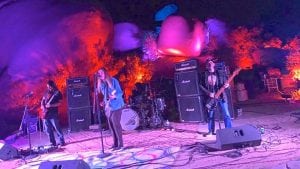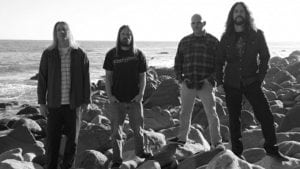Stoner rock legends Fu Manchu have been cranking out crunchy, raunchy, gut-punching music for over 27 years now. Their expansive catalogue is chock full of riffs that inspire breaking speed limits and furniture, and has undoubtedly been the soundtrack to countless nights of debauchery and mayhem. And now, after three years, the band is gearing up to add some more weapons to their sonic assault, and more reasons to grow out your hair and bang your head aggressively.
On the figurative eve of this new album, the band will take the stage in the small, intimate, hipster room that is The Wayfarer in Costa Mesa on June 10. If you know anything about this band’s stage presence, you know that it’s a powerhouse of intense, bursting energy. With solos that melt your face off your face, drums that throttle your limbs to exhaustion, and vocals that bring the thrashing punk out of us all, the band is set to shake the little Wayfarer to its foundations.
Speaking about the new album, as well as his views on music and art in general, drummer Scott Reeder checked in for a quick chat in advance of their upcoming show.
CONCERT GUIDE LIVE: Your last album came out in 2014. Which begs the question, is anything currently in the works? Is this a typical amount of time between records for you guys?
SCOTT REEDER: Well, it’s not like we’ve been sitting around for three years. This year we actually had to kind of go, ‘Ok, we’re not playing any shows, we have to focus on doing an album’. You know, because once you start playing shows, you gotta rehearse, and it’s a whole switching gears thing. But it’s actually worked out, because we have kind of like a special thing that we’re trying to get done with this record. We’re trying to do something – it’s nothing huge – and I don’t really want to reveal anything yet on it…
CGL: But it’s something different?
SR: Yeah, it’s something different for us. And if we can pull it off… we were actually supposed to start recording tomorrow. But we pushed it back because the facilities weren’t exactly what we wanted for right now. You know, all the minutiae. It’s hard to find that kind of shit.
CGL: Well, attention to detail is what makes a good album though.
SR: Well yeah, but we’re hoping to get all this stuff done by June and have the record out in October. And then be doing the States and then Europe, the whole thing that we usually do.
CGL: So, could we expect to hear any of these new songs at The Wayfarer?
SR: Hmmmm… Maybe… It’s a possibility… (laughs). I’m always up for doing that. It’s just – whether the singer can remember the new words. Which really doesn’t matter, because no one knows the words anyways. But yeah, I’m pretty sure we’ll play some new stuff. That’s pretty much all we’ve been rehearsing is all the new stuff.
CGL: You mentioned earlier that you don’t think there’s a place for acoustic music in Fu Manchu, because that’s not what people want to hear from your band. Does this mean that you guys write music with the feedback from fans in mind?
SR: Ahhhh… no, we really don’t write for the fans. It’s more for us. Because you can never go like, ‘Oh people will like this’. You have to be stoked on shit first before other people can get stoked on it. You can’t just play stuff you don’t like and be all, ‘Well, we’re gonna play this because we know people will like it’.
CGL: Yeah, that’s not what art is really about…
SR: Well, I’m not an artist. I don’t paint houses. I play drums. C’mon. The whole artist thing is a little bit overblown, I think. ‘Oh, I’m an artist’. Oh, you’re an artist? What, you play with clay, and sculptures and all that shit? ‘No, I play drums’. C’mon.
CGL: Okay, so then what do you consider art to be?
SR: It’s sort of in the eye of the beholder I suppose. If people want to label it that, they can. But from my perspective… I think it’s people trying to put a higher meaning on what they do. You can do that. But it’s subjective. People are the ones who put the meaning on what you do. They put the meaning on it by relating it to their experiences and common experiences that everybody has. So, in that sense, you listen to something and go like, ‘Oh man, this guy thinks the same that I do,’ or, ‘He says that thing that I’m trying to say, that I can’t say. And it makes me feel good because I feel like he gets me’.
And that’s really what makes community, I think. So, I guess if we were involved in any kind of community it would be like, we do the thing that we do and I guess we have to like it before anyone else does. So, in that sense, we are connected to other people who like our music.

